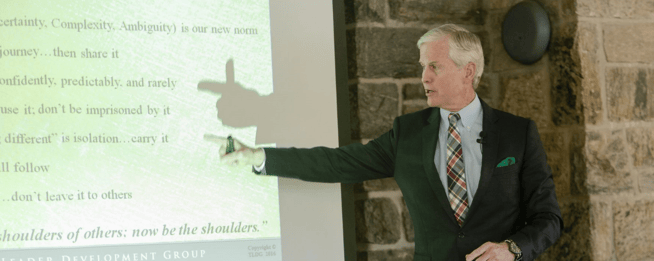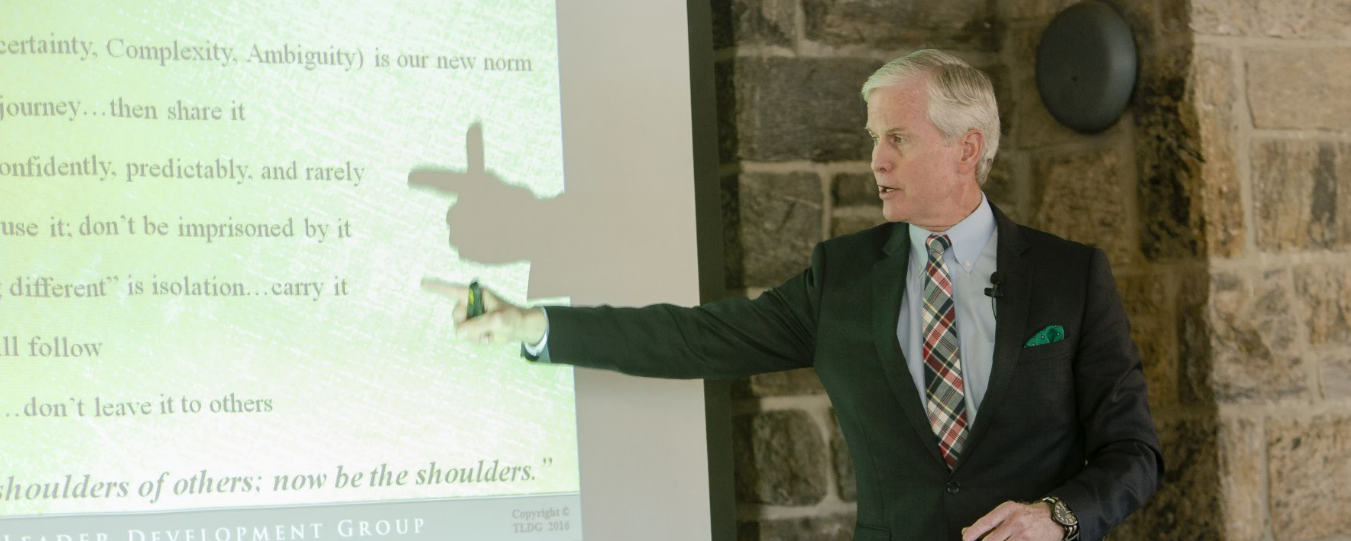As Chris Sugden wrote in a recent blog post, Edison just hosted our 5th annual CEO Summit at West Point. With approximately 90 attendees, the Summit was held in partnership with The Thayer Leader Development Group (TLDG). I learned so much from our speakers and CEOs throughout the program. Thanks to all who attended and special thanks to Dan Rice and the entire TLDG team for an outstanding experience!
I have been fortunate to learn how to effectively operate businesses from some seriously great leaders and, quite honestly, not-so-great leaders. I always have made a point of trying to incorporate the good into my natural leadership style while tying to eliminate the bad when it creeps to the surface. I imagine many others have had similar experiences and it was reassuring to hear that our keynote speaker, Major General James “Spider” Marks (USA, Retired, USMA 1975), has done the same while leading effective operations throughout a stellar military and business career. Most importantly, he explained through personal stories and anecdotes that business leaders must embrace VUCA (volatility, uncertainty, complexity, ambiguity) and provide vision, understanding, clarity, and agility to successfully operate.
 We all know that operating a high-growth company in a VUCA environment requires leaders to provide vision, develop agile strategies, and execute flawlessly. You, your team, your customers, and your board can measure those capabilities. They are usually quantifiable in a specified period of time, and in my opinion, table stakes to be considered a great operator. But to be a truly effective and successful, we must have the ability to motivate and drive our teams through conviction of purpose, high moral character, and personal courage.
We all know that operating a high-growth company in a VUCA environment requires leaders to provide vision, develop agile strategies, and execute flawlessly. You, your team, your customers, and your board can measure those capabilities. They are usually quantifiable in a specified period of time, and in my opinion, table stakes to be considered a great operator. But to be a truly effective and successful, we must have the ability to motivate and drive our teams through conviction of purpose, high moral character, and personal courage.
Of the many leadership lessons learned from General Marks, my top 4 were:
1. Share power to gain trust
Leadership gurus talk about the importance of building trust, but many CEOs aren’t sure how to go about it. Giving power to your subordinates and allowing them make decisions is the surest way to create a trusted bond and to efficiently operate a business. The benefit is that your best people will relish the opportunity and quickly demonstrate why your trust was well founded. As important, they will be willing to speak honestly with you no matter the situation. Trust leads to commitment—to you, to other employees, and to the company.
2. Gain commitment
General Marks spoke a lot about leading in difficult situations. And, he certainly knows about difficult situations having led the mission that brought down Saddam Hussein as well as was the top intelligence officer during the LA Riots.
One of the points that really hit home was the need to gain commitment from the troops. Commitment is not a given. He spoke of an old boss who never shared power, didn’t trust his team, and used negative reinforcement as a management tool. To be fair, that boss was able to will his team to victory even though his team was not committed--they were compliant. In today’s world, we need commitment across our organizations in order to achieve success.

3. Show up and be predictable
General Marks took at least one positive away from his boss mentioned above—he always was in the middle of the action and was predictable. That really hit home with me and I hope with many of our CEOs.
Teams want to receive solid guidance in a calm, clear manner from leaders who exude confidence and work “in the trenches.” Good decisions come from leaders who have a good view of the situation and are willing to be in the middle of the action. Highly related to visibility is the need to be a predictable leader. You must be agile in your thinking and decision-making, but the predictability of your leadership style is critical if you expect troops to follow and commit themselves to the cause.
4. Write “your ending”… don’t leave it to others
Great operators plan for the future by building a sustainable organization. Building trusted relationships with your team by sharing your power is the first step and will allow you to plan for succession in an open and honest way. If you don’t hire and retain senior executives that at some point could take over for you, then you haven’t written your own ending.
At Edison, I’m fortunate to work with portfolio company CEOs who have these great qualities and many more. Based on the CEO Summit feedback we’ve received, I think it’s fair to say that each and every CEO attendee left the event with even more weapons in their operating arsenal. That was our goal, and I’m truly thankful to the entire Edison team for their support and collaboration throughout the event.


.png)